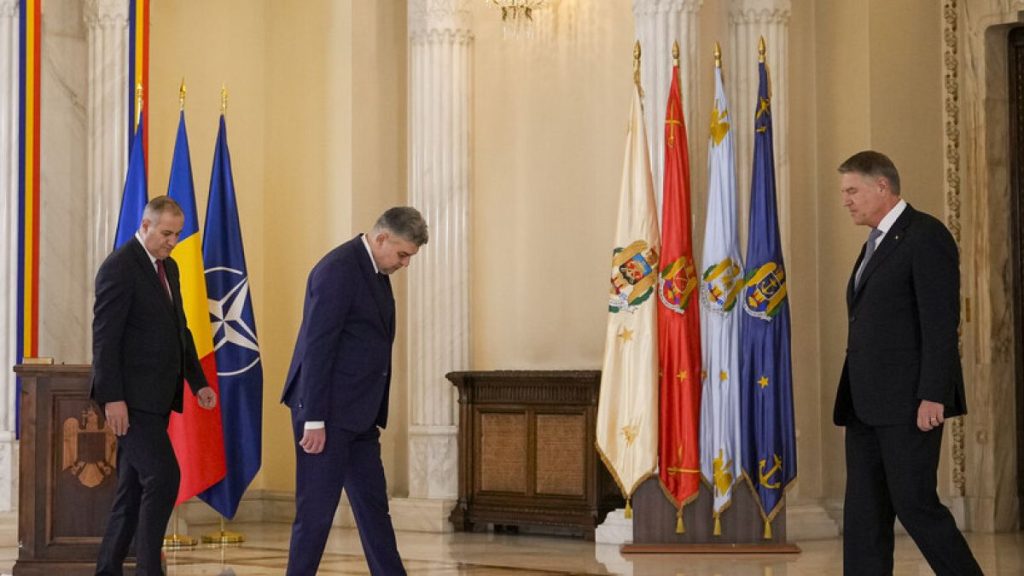Romania embarked on a new political chapter on Monday, June 12, 2024, with the swearing-in of a new government led by Prime Minister Marcel Ciolacu of the Social Democratic Party (PSD). This transition marks a significant moment for the country, aiming to restore stability and reaffirm Romania’s commitment to its pro-European trajectory after a period of political turbulence. Ciolacu’s coalition government, comprising the PSD, the National Liberal Party (PNL), and the Democratic Alliance of Hungarians in Romania, secured a comfortable majority in parliament, signifying a mandate to address the pressing challenges facing the nation.
The composition of the new government reflects a power-sharing agreement among the coalition partners. The PSD holds the majority of ministerial positions, controlling eight key ministries, while the PNL oversees six. The Democratic Alliance of Hungarians in Romania rounds out the cabinet with two ministerial posts. This distribution of power aims to ensure a balanced representation of interests and facilitate collaborative governance. President Klaus Iohannis, who presided over the swearing-in ceremony, emphasized the importance of unity and collaboration within the new government, urging all ministers to work together for the betterment of the Romanian people. He also highlighted the shared commitment to maintaining Romania’s strong ties with the European Union, a sentiment echoed by the incoming ministers.
The formation of this new government follows a tumultuous period in Romanian politics, marked by a controversial election cycle, a surge in far-right sentiment, and allegations of electoral irregularities. The December 2023 parliamentary elections, held between the two rounds of the presidential race, witnessed a notable rise in support for the far-right Alliance for the Union of Romanians, which secured second place. This development raised concerns about the potential direction of Romanian politics and its implications for the country’s relationship with the European Union. President Iohannis’ decision to nominate Ciolacu as Prime Minister was seen by some as a strategic move to counter the growing influence of the far-right and maintain Romania’s pro-European course.
The preceding presidential election had further exacerbated the political instability. The first round saw Calin Georgescu, a far-right outsider, unexpectedly emerge as the frontrunner, pushing Ciolacu into third place. This outcome triggered widespread allegations of electoral violations and even suggestions of Russian interference, deepening the political crisis. In an unprecedented move, Romania’s Constitutional Court subsequently annulled the presidential race, citing irregularities and concerns about the integrity of the electoral process. This decision left President Iohannis in office until a new election could be organized, adding another layer of complexity to the already volatile political landscape.
Against this backdrop of uncertainty and division, the new government faces a formidable task. Prime Minister Ciolacu acknowledges the challenges ahead, recognizing the deep political crisis and the erosion of public trust. He has emphasized the coalition’s commitment to regaining the confidence of the Romanian people and addressing their concerns. The government’s immediate priorities are likely to include stabilizing the political situation, strengthening democratic institutions, and reaffirming Romania’s place within the European Union and NATO. These efforts will require navigating complex political dynamics, managing competing interests within the coalition, and addressing the underlying causes of public discontent.
The success of Ciolacu’s government will hinge on its ability to deliver on its promises, restore stability, and rebuild trust in Romanian politics. The international community, particularly the European Union, will be closely watching developments in Romania, hoping for a return to a predictable and stable political environment. The government’s ability to effectively address the challenges it faces will be crucial not only for the future of Romania but also for the broader stability of the region. The road ahead may be challenging, but the formation of this new government represents a crucial step towards a more stable and prosperous future for the Romanian people.














